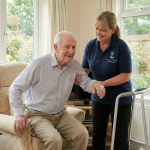Effective Diabetes Care at Home: A Nurse’s Expert Guide
Estimated reading time: 5 minutes
- Understanding the types of diabetes and their management.
- Five expert steps for effective diabetes care at home.
- Warning signs to recognise when to seek medical help.
- How More Time Healthcare can support you locally.
- Contact us for a free consultation on diabetes management.
Table of contents:
- Understanding Diabetes at Home
- Five Expert Steps for Managing Diabetes at Home
- Warning Signs and When to Seek Help
- How More Time Healthcare’s Carers Support Diabetes Management Locally
- Take the Next Step: Book Your Free Consultation
Understanding Diabetes at Home
Diabetes is a chronic condition that affects how your body uses glucose, which is crucial for energy. There are two main types of diabetes:
- Type 1 Diabetes: This form occurs when the body’s immune system attacks and destroys insulin-producing cells in the pancreas. Individuals with Type 1 diabetes require lifelong insulin replacement through injections or a pump.
- Type 2 Diabetes: More commonly diagnosed, Type 2 diabetes develops when the body becomes resistant to insulin or fails to produce enough. Management for Type 2 may involve lifestyle changes, oral medications, or insulin therapy.
Living with uncontrolled diabetes can lead to chronic complications affecting major organs and systems in your body, such as your heart, kidneys, and nerves. With effective home management, supported by professional healthcare providers, many complications can be prevented, improving overall quality of life and reducing hospital visits (Mayo Clinic; PMC).
Five Expert Steps for Managing Diabetes at Home
To empower families managing diabetes, we offer five evidence-based steps that can transform how you handle diabetes care:
1. Monitor Blood Glucose Effectively
Monitoring your blood sugar levels is essential for safe diabetes management. Make use of glucose meters or continuous glucose monitors (CGMs) as directed by your healthcare team. Regular monitoring helps you identify patterns and make necessary adjustments to your diet and medication (CDC).
Tips for Effective Monitoring:
- Wash your hands before testing to ensure accurate results.
- Keep a log of your readings for discussions with your healthcare provider.
- Understand your target range and create a plan to address fluctuations.
2. Maintain a Healthy, Balanced Diet
Your diet plays a critical role in managing diabetes. Aim for meals that include:
- Plenty of vegetables and whole grains.
- Lean proteins to support muscle maintenance.
- Whole foods while minimising processed options and sugary snacks.
Developing a balanced diet that considers portion control and consistency can greatly enhance blood sugar control (Healthline; AAFP).
More Time Healthcare’s carers can assist in tailoring meal plans, catering to dietary preferences, and ensuring that nutritional needs are met.
More Time Healthcare’s carers can assist in tailoring meal plans, catering to dietary preferences, and ensuring that nutritional needs are met.
3. Stay Active Safely
Physical activity can significantly improve insulin sensitivity and assist in lowering blood sugar levels. Strive for at least 150 minutes of moderate aerobic activity per week, in manageable increments (PMC).
Practical Tips for Exercise:
- Start slow if you are new to exercise, gradually increasing your intensity.
- Monitor your blood sugar before and after workouts to see how your body responds.
- Consult your carer for a personalised exercise plan that fits your abilities and lifestyle.
4. Stick to Treatment Routines
Consistency in medication regimen is vital for effective diabetes management. Adhere closely to the prescribed medication plan, whether it involves insulin, oral medications, or other treatments. Setting reminders and utilising pillboxes can help maintain an organised routine (CDC).
Our nursing staff at More Time Healthcare can provide assistance with administering medications and addressing any concerns or side effects you may experience.
5. Prioritise Stress and Sleep Management
Managing stress and ensuring adequate sleep is crucial as they can both impact blood sugars. Techniques for managing stress might include deep breathing, meditation, or gentle exercise, while maintaining a consistent sleep schedule can also aide in better blood sugar control (Healthline; Diabetes Journal).
If chronic stress or sleep disruptions persist, consult with a carer or healthcare provider for tailored strategies.
Warning Signs and When to Seek Help
It’s vital to be aware of concerning symptoms that may indicate immediate medical intervention is required. Here are several key warning signs to watch out for:
- Signs of Low Blood Sugar (Hypoglycaemia):
Symptoms include shakiness, sweating, confusion, dizziness, and blurred vision (Mayo Clinic). - Signs of High Blood Sugar (Hyperglycaemia):
Look for excessive thirst, frequent urination, fatigue, nausea, and headaches. - Foot Issues:
Pay attention to sores, blisters, or wounds that do not heal properly. - Sudden Changes:
Unexpected thirst, changes in appetite, or frequent infections can be concerning. - Other Urgent Symptoms:
If you or a loved one experiences difficulty breathing, vomiting, severe stomach pain, or confusion, seek medical assistance promptly.
If any of these symptoms arise, don’t hesitate to contact your healthcare provider or reach out to the nursing team at More Time Healthcare for urgent advice.
How More Time Healthcare’s Carers Support Diabetes Management Locally
At More Time Healthcare, we are dedicated to ensuring that you don’t have to manage diabetes alone. Our professional nursing team offers crucial support that includes:
- Ongoing home visits to regularly monitor vital signs.
- Assistance with administering medications or insulin as required.
- Personalised dietary plans and exercise guidance.
- Support and management for stress-related factors and emotional wellbeing.
- Early detection of complications with rapid escalation to your GP or hospital when necessary.
Our trusted carers serve families in Essex, Thurrock, Southend-on-Sea, Romford, and Dartford, offering compassionate care tailored to individual needs.
Take the Next Step: Book Your Free Consultation
If you or someone you care about is managing diabetes and needs additional support, consider reaching out to us for a free, no-obligation consultation. Our experienced nursing team is here to help you create a safe and effective diabetes care routine at home.
Contact us today to book your free consultation and discover how our home nursing services can simplify diabetes care and improve quality of life.










